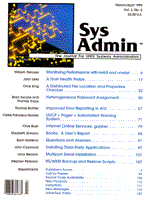Sidebar: Installable Device Programs
On my Esix SVR4 system, I have 13 installable device
programs, four
of them with no man page documentation. I have no idea
what three
of those four do, although I have some guesses. Those
13 files are:
- idbuild(1M)
- This is the standard program
to build a new UNIX kernel. After configuring any device
driver changes,
installing new device drivers, or changing any of the
kernel's tunable
parameters, you can run idbuild to build a new kernel.
Many
kernel-changing scripts automatically run this program
for you. This
program calls other "id" programs to get its
work done.
- idcheck(1M)
- You can use this program
to discover specific information about installed device
drivers. It
finds out whether a device is installed, or whether
a vector, a DMA
channel, or an address is already used.
- idconfig(1M)
- This program takes configuration
files for the devices, tunable parameters, and file
systems and produces
kernel definition files.
- idinstall(1M)
- You can use this program
to add, remove, or update any of the device driver files,
or to get
the currently installed version of those files. Device
driver programmers
use this program during development and installation
of new device
drivers.
- idmaster
- Esix doesn't document this
program and the standard UNIX man pages have nothing
to say either.
I suspect it has something to do with a device driver's
master file.
A device driver's master file information is placed
in the /etc/conf/cf.d/mdevice
file. This program's command line usage is:
idmaster (-a)|(-u)|(-d dev) [-i dir] [-o dir]
If any reader knows what this or the other undocumented
programs listed in this sidebar do, please let me know.
- idmkenv
- This is another program that
Esix doesn't document. The program doesn't show a command
line usage.
I suspect it has something to do with the device driver
nodes.
- idmkinit(1M)
- As part of the kernel
rebuilding procedure the /etc/inittab file is rebuilt.
This
program takes init modules from /etc/conf/init.d and
combines
them with /etc/conf/cf.d/init.base to reconstruct inittab.
- idmknod(1M)
- When init level 2 (multiuser)
operation starts after a kernel remake, this program
executes. It
removes all devices not listed as required in the /etc/conf/cf.d/mdevice
file's third field. Then it creates new device nodes
according to
the specifications in the /etc/conf/node.d directory.
- idmkunix(1M)
- This program creates the
UNIX kernel that boots. It builds the kernel from the
files in the
/etc/conf/pack.d directory.
- idreboot
- This is another program that
Esix doesn't document. It prompts to reboot the system,
offering ENTER
to reboot and ESC to quit. If you request a reboot,
it runs shutdown(1M)
bringing the system to init level 0. Installation scripts
could run this program after configuring and rebuilding
a new kernel.
- idspace(1M)
- This program tests whether
enough space exists in the /, /usr, and /tmp
directories, each of which could be separate file systems.
If the
/ directory has enough space to store a larger kernel
and
enough inodes remaining for the new devices, idspace
continues.
It applies similar tests to /usr and /tmp only if
they're filesystems.
- idtune(1M)
- Use this program to tune
kernel parameters. You must know the name of a kernel
parameter and
a meaningful value for it. All of the kernel parameters
are in the
file /etc/conf/cf.d/mtune, while local system tunings
are
in /etc/conf/cf.d/stune. Each line in the mtune file,
other than comment lines, is a record containing the
parameter name,
the default, minimum, and maximum values for that parameter.
The stune
file contains only the parameter name and desired value
to give that
parameter.
- idval
- This is another program that
Esix doesn't document. The program shows a command line
usage statement:
compare: must specify two values to compare compare -l | -g value1 value2
Because the usage statement refers to the name "compare,"
I thought it might be a hard link to something else
named compare.
But, it isn't hard linked and there's no man page for
compare. I suspect
it may be used for comparing kernel parameters, but
I'm not sure.
|

